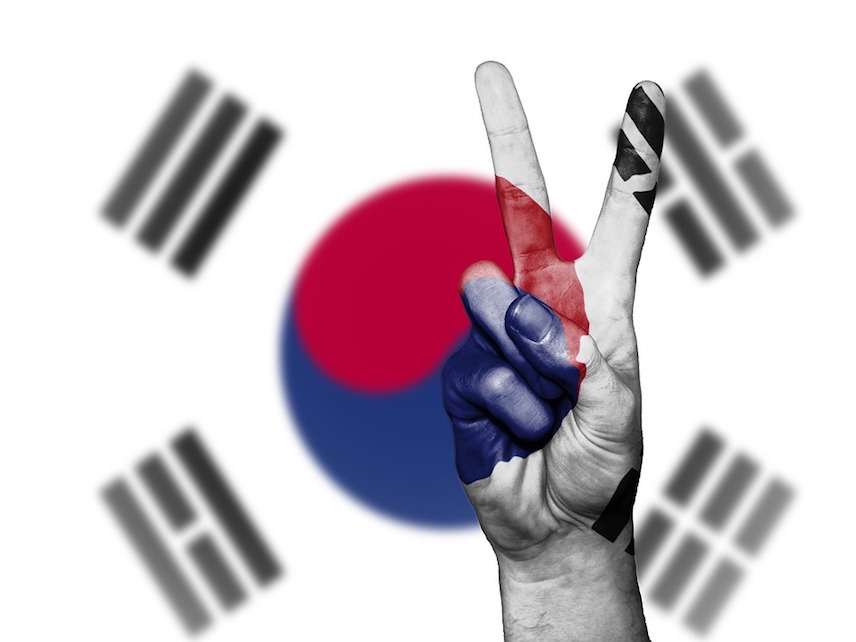Vintage Radio Propaganda of the Korean War
Friday A/V Club: The broadcasts of Seoul City Sue

The most welcome world news this week is the budding rapprochement between North and South Korea—a serious peace push in a place that less than a year ago seemed ready to erupt into nuclear war. Among other things, this includes a pledge to take a step beyond the ceasefire that ended the Korean War of 1950–53 and sign a treaty that brings the conflict to a formal close.
As those hostilities hopefully move toward a full termination, here's an artifact from the days when they were a shooting war. Not long after U.S. troops arrived in Korea, a woman nicknamed Seoul City Sue started transmitting radio propaganda to the Americans. "In these broadcasts," Paul Edwards writes in Unusual Footnotes to the Korean War, "she would quietly talk to the American GIs suggesting that they would be better off at home where they could have clean sheets and eat ice cream. She also continually suggested that their girlfriends at home would not wait very long before they sought other men to comfort them. At times she would read off the names from dog tags taken from dead Americans, and would warn the listeners that their names would soon be read on the broadcast."
Here's a snippet from one of her shows, coupled with some film footage from the war:
Seoul City Sue was apparently Ann Wallis Suh, a former Methodist missionary from Arkansas; it is unclear whether she made the broadcasts willingly or unwillingly. Soldiers sometimes compared her to the World War II propaganda broadcaster Tokyo Rose—usually unfavorably, since Tokyo Rose mixed her taunts with western music. Seoul City Sue did not, unless a Sousa march counts.
Writing in September of 1950, UPI war correspondent H.D. Quigg gave Sue a scathing review:
She talks in a monotone. Her voice is icy. She exudes the passion of a well boiled vegetable. What in the name of Lenin she thin[k]s she is going to accomplish and who in tarnation she expects to impress with her type of spiel beats the living daylights out of me….
She can't kid the GI. He's been kidded by experts in all sorts of propaganda since childhood. Also he's accustomed to getting some entertainment when he turns on the radio. Seoul City Sue gives him amateur kidding and no entertainment at all.

Cynics might note that if soldiers found themselves fantasizing about the feminine voice on their radios, that detail would not necessarily make it into the American press. But boiled vegetable or not, it seems rather doubtful that Suh had much impact on the troops' morale. Even when she talked truthfully about how lousy life could be at the front, she wasn't telling her listeners anything they didn't already know.
Charles Robert Jenkins, an American soldier who defected to North Korea in 1965 and left the country four decades later, writes in his memoir The Reluctant Communist that he encountered Suh shortly after he arrived in Pyongyang:
I met her in 1965 when I went to the "foreigners only" section of the No. 2 Department Store. I was by myself. (Our leader at the time had just said, "Yeah, go on; go ahead," when I asked to go to the store and let me go alone.) I recognized her from [a propaganda pamphlet], so I walked up to her and said, "Hello, Suhr Anna-senseng" (senseng is the Korean word for "teacher"). It was winter, and she was wearing a black leather overcoat, very put-together. She looked surprised and turned, looked at me, and said, "Oh, you must be the American who just came over." I said, "Uh-huh," but she was spooked. The second we met, she wanted to get the hell out of there. She excused herself, saying she really needed to be going, and was gone.
Years later, Jenkins heard that in 1969 the North Korean government had accused the former Seoul City Sue of spying for the South and had shot her. "I have no idea if any of this is true," he reports, "but that is what they told me, and we certainly never saw her again or heard from anyone who had."
(For past editions of the Friday A/V Club, go here. For another installment involving the Korean War, go here. For another installment involving North Korean propaganda, go here.)


Show Comments (49)